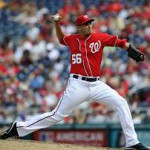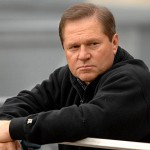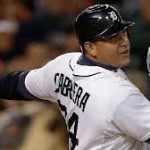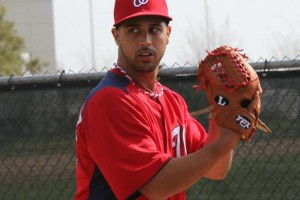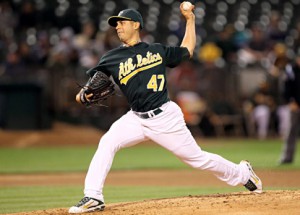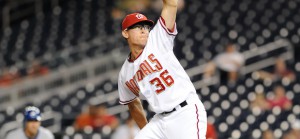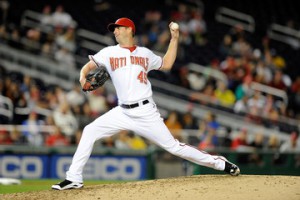Hey, what great timing for another Bill Ladson inbox (posted 2/5/13). Baseball news is light, pitchers and catchers report in a week or so, and I’m not quite ready to continue my Stats series.
As always, I write my answer before reading his, and sometimes edit questions for clarity:
Q: Do you think general manager Mike Rizzo will add starting pitching depth before Opening Day? Does the lingering possibility of a Gio Gonzalez suspension change whom the Nationals would consider acquiring?
A: In Ladson’s 1/22/13 mailbag, some one asked what could prevent the Nats as constructed from winning the World Series in 2013. I answered Rotation Injuries and Luck. Well, in the wake of the Miami PED scandal, I guess the third answer may be “PED scandal.”
This is a tough question to answer; Gio Gonzalez has denied the rumors, but the newspaper in question (the Miami New Times) clearly only named Gonzalez because they felt like the evidence they had in hand was irrefutable. Many other players have not been named. So as a GM; how do you go about preparing for 2013 at this point? If Mike Rizzo knows that Gonzalez is getting suspended, you have to think he’s on the horn to his buddy Scott Boras about possibly buying Kyle Lohse, which is clearly the best remaining FA starter. But Lohse isn’t coming cheap, and likely isn’t coming on a one year deal, and would cost another draft pick (I believe). The Nats are already topping $120M in payroll; would they go to $135M?
If we think Gio at least gets a pass and the suspension is put off, maybe Rizzo’s recent activities of signing random starters to minor league contracts is going to be sufficient.
Ladson mentions Javier Vazquez and the ever-present rumors of Christian Garcia going to the rotation as possible Gonzalez replacements if he gets suspended quickly. Probably fair; Vazquez may be a great, cheap alternative.
Q: Everyone is saying that it’s going to be a two-team race in the National League East between the Nationals and Braves. Do you think the Phillies have a shot to contend with both these teams, or is their time done?
A: Boy, its hard to look at the aging, expensive Phillies lineup they had in place in 2012, which suffered injuries and setbacks and creaked their way to a .500 record, and then look at the highly questionable slew of acquisitions and signings this off season (Ben Revere, John Lannan, Michael Young, Delmon Young and everyone’s favorite anti-gay advocate Yuniesky Betancourt) and not, well, giggle at where this team is going. My favorite baseball joke from the off-season goes like this: “The Phillies wanted to get Younger this off-season, so they signed Michael Young and Delmon Young.”
The two Youngs were both negative WAR players last year, Lannan is a 5th starter, Revere was a backup centerfielder who the Phillies traded some decent assets for, and Betancourt is who he is (though admittedly he’s on a minor league deal and seems at best set to be a utility infielder behind starters Jimmy Rollins and Chase Utley). I see the Phillies being a very bad defensive team with the two Youngs in the starting lineup, I see some serious questions in the back side of the rotation, and I see continued regression and louder complaints about Ryan Howard‘s contract. Fun times a-coming in Philadelphia. Ladson actually says that the Phillies will “be improved with Michael Young.” Bill! Have you seen Young’s WAR figures from 2012?? He was a NEGATIVE WAR player at both major War sites. That means he makes your team worse! Now, he was completely servicable in 2011 … so if you want to make the argument to me that 2012 was an aberration for an aging hitter playing in a hitter’s park, well I guess that’s a stance you can take. But pretty much every other pundit in the blogosphere has loudly criticized the Philadelphia moves this off-season.
Q: What is the status of Lucas Giolito? When do you see him pitching in D.C.?
A: Tommy John surgery in Late August (I can’t remember the exact date; it was 8/24/12 when I posted this highly-critical article about Lucas Giolito and the situation), so figuring a typical 12-month rehab session before he’s actively throwing again in pro-games basically puts him at the end of the 2013 minor league season. Which means he’ll be 20 before he really is ready to start his pro career in the spring of 2014. Figure 4-5 years average case for typical high schoolers to work their way up the systems (perhaps fewer years given his talents and pedigree, as we’ve seen with someone like Dylan Bundy in 2012, who made his way from low-A to AA in his first pro season out of HS and got a late Sept callup to the majors) and we’re probably looking at 2016-2017 before seeing him in the majors. If, of course, he recovers from surgery, hasn’t destroyed his mechanics, is effective, matures, doesn’t get re-injured, or any of the million other pitfalls that typically befall high school arms drafted in the upper rounds. Ladson thinks he’s pitching pro games “after the all-star break” and is in the majors in 3 years. Wow. That is optimistic.
Q: How do you think Henry Rodriguez will do? And what do you think his role in the bullpen will be?
A: I am, and always have been, pessimistic on Henry Rodriguez. I hated the Willingham trade that got him here. He’s forced the team to invent injuries to stash him on the DL coming out of spring training b/c he has no options. He led the league in wild pitches in 2011 in just 65 innings. He had a 69 ERA+ in 2012. At some point when does the team say, “OK, its nice that he throws 100mph. But enough is enough; we need a reliable pitcher who can deliver when called upon.” Perhaps Spring Training 2013 is that time.
What do I think his role will be? I’m sure he’ll look great in Spring Training again, will break camp with the team, and very well may look halfway decent for a while. But just like every other season, he’s going to have those 3-walk outings where he pitches a 1/3 of an inning and gives up 4 runs, and then the manager will be afraid to use him unless the team has a 5-run lead. And eventually we’ll call up Garcia to replace him and move on. That’s my prediction for Rodriguez. Ladson says the team should “attempt to trade him if he is not impressive this spring.” Wow, that’s sage advice; if only every team could trade its under-performing players and actually get value back whenever it wanted.
Q: Can you predict Washington’s Opening Day lineup if all available players are healthy?
A: Easy. I’ll even predict the batting order. Span-Werth-Harper-Zimmerman-LaRoche-Desmond-Espinosa-Suzuki-Strasburg. Ladson predicts the same names but in a lineup order that makes no sense from a lefty-righty balance perspective.
Q: After announcing his retirement, do you think Brian Schneider is a possible candidate to replace Johnson as manager of the Nationals?
A: Wow, yet another speculative question about the future Nationals Manager. He took a question about the manager on 1/28/13, and on 1/22/13. And on 1/14/13. I guess people like speculating on the Nats next manager. Not repeating what i’ve said on the topic before, is Brian Schneider a candidate? Why would he possibly be a candidate to manage the major league team of a system he left 5 years ago? Why would the Nats pick a manager who’s never managed a day in his life? Ladson breathes some common sense on this one.
Q: I think Garcia has to be on the Opening Day roster, so is he in the bullpen or someplace else? Can the 25-man roster accommodate him and all the other pitchers?
A: “Someplace else?” Like where? In the outfield? I like Garcia too, but the team has a numbers problem in the bullpen. Storen, Clippard, Mattheus, and Stammen have all more than earned their spots. Soriano is being paid a ton of money. Duke is guaranteed a spot (he’s the only lefty and he’s got enough service time to refuse a demotion). Oh, and Rodriguez has no options. So there’s your 7-man bullpen. Notice there’s only one left-hander out there; if you believe that you need left-handers to get left-handed batters out, then the bullpen needs to sacrifice one of the righties in order to have a second lefty (Bill Bray?) in there.
The only way I see Garcia making this bullpen is if the team runs out of patience with Rodriguez and DFAs/DLs him, or if the team trades away one of their closer-quality surplus guys, or if maybe someone like Mattheus/Stammen (both of whom do have options) struggles or gets hurt. Otherwise look for Garcia to get stretched out and get looks as a starter in AAA. Ladson says he’s confident Garcia is on the 25-man roster …. ok explain it to me then based on the above paragraph. Who is he replacing?
